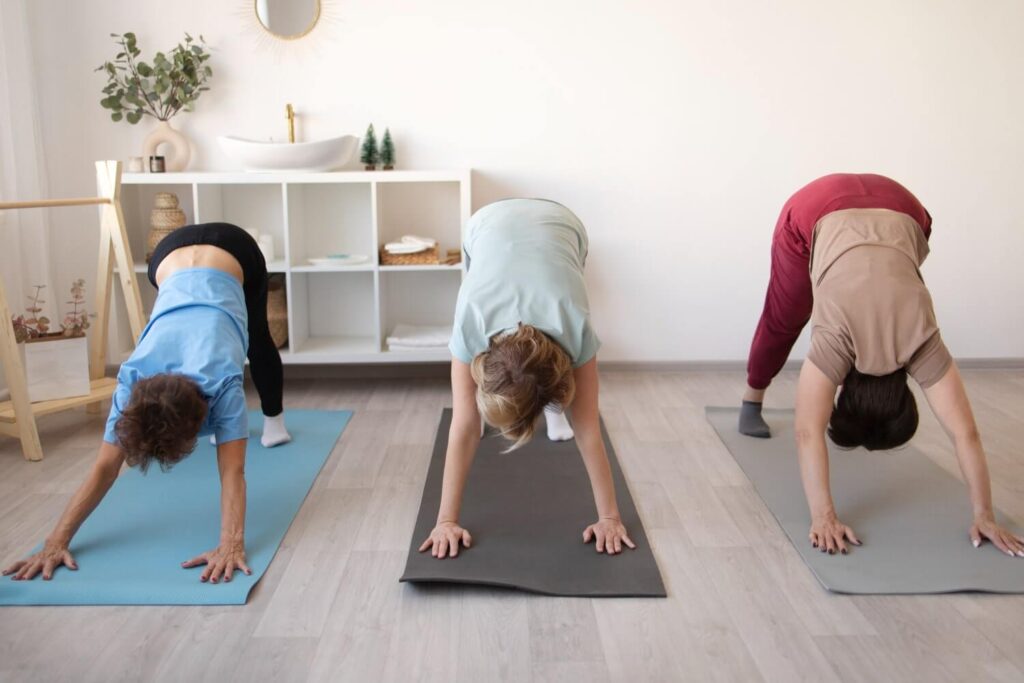Addiction can feel like a relentless storm, battering your body, mind, and spirit. The thought of recovery may seem daunting, a distant shore amidst crashing waves. But what if there was a powerful tool readily available, a hidden life raft waiting to be deployed in your fight for lasting sobriety? This life raft is not a magic solution, but it’s a force waiting to be harnessed – the power of exercise.
Traditionally, addiction recovery programs have focused heavily on addressing the psychological aspects of dependence. However, the path to healing is more comprehensive. Our bodies and minds are intricately connected, and incorporating physical activity into your recovery journey can be a game-changer. Let’s delve into the science behind how exercise becomes a beacon of hope in the stormy seas of addiction.
How Exercise Orchestrates Change Within
Imagine your brain as a complex orchestra, with different neurotransmitters acting as the musicians. When you exercise, your body releases a cascade of these neurotransmitters, most notably endorphins. Endorphins are the body’s natural mood elevators, creating feelings of euphoria and well-being. Benefits of exercise in addiction recovery, these endorphins can be a powerful weapon against cravings and depression, common foes threatening to derail your progress.
But the benefits extend far beyond a temporary mood boost. Exercise acts like a conductor, directing the orchestra to play a more harmonious tune. It improves sleep quality, lulling you into a restful slumber that combats stress, a major relapse trigger. Energy levels rise, replacing fatigue with a sense of vitality that motivates you to keep moving forward. Perhaps most importantly, exercise strengthens the reward system of your brain. Addiction disrupts this system, making you seek unhealthy pleasures. Exercise helps rewire these neural pathways, allowing you to experience genuine joy from healthy activities.
The Psychological Powerhouse of Exercise
The benefits of exercise extend far beyond the realm of the physical. As you move your body, your mind experiences a profound transformation. Self-confidence and self-esteem blossom with each step, each push-up, each conquered lap around the track. You witness your own strength and resilience firsthand, building a sense of empowerment that fuels your recovery journey.
Exercise also equips you with powerful tools to manage stress, a significant factor in relapse. Feeling overwhelmed? Go for a brisk walk and let the rhythm of your steps wash away tension. Anxiety creeping in? A yoga session can help you find inner peace and focus. Exercise becomes a healthy coping mechanism, a way to channel difficult emotions into positive action.
The psychological benefits go deeper. Exercise fosters a sense of discipline and routine, vital components of long-term recovery. As you commit to regular physical activity, you build a foundation of self-care that extends to other areas of your life. This newfound discipline can translate into healthier eating habits and improved sleep patterns, creating a holistic approach to healing.
Finding Your Perfect Fit: Exploring the Exercise Universe
The beauty of exercise lies in its vast and welcoming universe. There’s no one-size-fits-all approach; the key is to find activities you enjoy. For some, the rhythmic pounding of their feet on the pavement is a source of liberation. Others may find solace in the synchronized flow of yoga poses. Perhaps the camaraderie of a group fitness class provides the motivation you need, or the quiet contemplation of a solo hike sparks joy.
The possibilities are endless:
- Aerobic Exercise: Activities like walking, running, swimming, or biking get your heart pumping, improve cardiovascular health, and boost your mood.
- Strength Training: Building muscle mass increases metabolism, enhances confidence, and promotes overall well-being.
- Mind-Body Practices: Yoga or Pilates combine physical postures with mindfulness techniques, promoting flexibility, stress management, and inner peace.
- Team Sports: Basketball, soccer, or joining a local running group provides social interaction, motivation, and a sense of belonging.
- Start Slowly and Gradually Increase Intensity: Don’t jump into strenuous workouts if you’re new to exercise. Begin with low-impact activities like walking or gentle yoga, and gradually increase duration and intensity as your fitness improves. Listen to your body and avoid pushing yourself to the point of pain.
- Find an Exercise Buddy: Having a partner in crime can boost motivation and keep you accountable. Look for a friend in recovery or join a group fitness class to create a support system and make exercise more enjoyable.
- Track Your Progress: Celebrate your achievements! Keeping a log or using a fitness app to track your workouts allows you to witness your progress over time. Seeing your hard work pay off will fuel your motivation to keep moving forward.
- Make it Fun!: Exercise shouldn’t feel like a chore. Explore different activities until you discover something you genuinely enjoy. Maybe it’s dancing to your favorite music, swimming in nature, or exploring new hiking trails. When you find joy in movement, you’re more likely to stick with it.
- Use Exercise as a Coping Mechanism: Cravings or stressful situations arise? Lace up your shoes and go for a walk. Feeling overwhelmed? Hit the gym for a quick sweat session. Exercise becomes a healthy outlet to channel difficult emotions and maintain your sobriety.

Exercise isn’t just about physical fitness; it’s a multi-instrumentalist, playing a beautiful symphony of benefits that resonate throughout your mind, body, and spirit during addiction recovery. Let’s delve into the key movements in this powerful composition:
Physical Benefits
- Boosted Mood and Reduced Cravings: Exercise triggers the release of endorphins, the body’s natural feel-good chemicals. This mood elevation can combat cravings and depression, common roadblocks on your recovery path.
- Improved Sleep Quality: Regular physical activity promotes deeper, more restful sleep. This is crucial, as quality sleep is vital for managing stress and preventing relapse.
- Enhanced Energy Levels: Exercise combats fatigue, a common symptom of withdrawal. Increased energy levels translate into a greater capacity to manage daily tasks and participate in recovery activities.
- Strengthened Reward System: Addiction disrupts the brain’s reward system, making you seek unhealthy pleasures. Exercise helps rewire these neural pathways, allowing you to experience genuine joy from healthy activities.
Mental and Emotional Benefits
- Increased Self-Confidence and Self-Esteem: Witnessing your own strength and resilience through exercise fosters a sense of accomplishment and self-worth. This newfound confidence empowers you to navigate challenges in recovery.
- Reduced Stress and Anxiety: Exercise provides a healthy outlet for channeling difficult emotions. Feeling overwhelmed? Go for a run. Anxious? Yoga can help you find inner peace and focus.
- Improved Discipline and Routine: Regular exercise fosters a sense of discipline and routine, vital components of long-term recovery. This newfound discipline can translate into healthier habits in other areas of your life.
Additional Benefits
- Social Interaction: Joining a group fitness class or participating in team sports provides a sense of belonging and social interaction, which can be crucial for those in recovery.
- Improved Cognitive Function: Studies suggest that exercise can enhance cognitive function, memory, and focus. This can be beneficial for managing daily tasks and coping with the challenges of recovery.
Exercise as a Catalyst for Positive Change
The impact of exercise transcends the physical realm. It becomes a metaphor for overcoming addiction. Just like building muscle requires consistent effort, recovery demands commitment and dedication. Regular exercise instills a sense of discipline and self-care, valuable tools on your path to lasting sobriety.
Furthermore, exercise can be a gateway to a healthier lifestyle. As you prioritize physical well-being, you may find yourself making positive changes in other areas. You might be inspired to adopt healthier eating habits to fuel your workouts or prioritize sleep to optimize recovery. Exercise empowers you to take control of your health and well-being, a core principle benefits of exercise addiction recovery programs.
Start Your Road to Addiction Recovery with River Rocks Recovery
At River Rocks Recovery, we understand the multifaceted nature of addiction. We believe in a holistic approach to treatment, incorporating exercise programs tailored to individual needs and preferences. Our experienced team can guide you in creating a sustainable exercise routine that complements your recovery plan.
Are you ready to take the first step towards a life free from addiction? Contact River Rocks Recovery today at (888) 905-6281 or submit an online contact form for a confidential consultation. Our compassionate staff will answer your questions and guide you on your path to lasting sobriety.
Conclusion
Addiction may feel like a relentless storm, but you are not alone. Exercise offers a powerful lifeline, a beacon of hope in your fight for recovery. By incorporating physical activity into your journey, you’ll not only improve your physical health but also experience a profound transformation in your mind and spirit. Remember, recovery is a marathon, not a sprint. Celebrate every step you take, and reach out for support when needed. With dedication and the right tools, you can find lasting sobriety and build a brighter, healthier future.
FAQ About Exercise and Addiction Recovery
Q. I’m not very fit. Can I still benefit from exercise?
Yes! Exercise is beneficial for everyone, regardless of fitness level. Start slowly with low-impact activities like walking, swimming, or gentle yoga. Gradually increase intensity and duration as you get stronger.
Q. What if I don’t enjoy traditional exercise routines?
The beauty of exercise lies in its variety! Find activities you genuinely enjoy. Explore options like dancing, hiking, biking, or team sports. The key is to find movement that brings you joy, making it more likely you’ll stick with it.
Q. How often should I exercise for recovery?
Aim for at least 30 minutes of moderate-intensity exercise most days of the week. Even shorter bursts of activity can be beneficial. Listen to your body and gradually increase duration and intensity as you progress.
Q. Is it safe to exercise during withdrawal?
Consult your doctor before starting any new exercise program, especially during withdrawal. They can advise you on safe and appropriate activities based on your individual needs.
Q. How can River Rocks Recovery help me incorporate exercise into my recovery plan?
At River Rocks Recovery, we understand the benefits of exercise in addiction recovery. We offer personalized exercise programs designed to complement your addiction therapy program and promote long-term sobriety. Our experienced team can guide you in finding activities you enjoy and create a sustainable routine that supports your overall well-being.




























